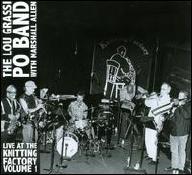Lou Grassi
from Summit, NJ
January 21, 1947 (age 79)
Biography
Many contemporary free jazz drummers take a loose, largely coloristic approach; Lou Grassi, on the other hand, is a more tightly wound, visceral player, his rhythmic vocabulary a compendium of muscular and unambiguous polyrhythmic ideas. Grassi's style is more proactive than reactive; he interrelates within a free jazz ensemble in much the same way a good bop drummer does -- commenting upon the contributions of his bandmates, yet maintaining a rhythmic independence that ultimately determines the overall direction of the improvisation. His forte is an ability to raise and maintain a level of excitement in a free context, a quality that helped make Grassi one of the better (and busier) drummers on New York's free jazz scene in the late '90s and early 2000s. Grassi began playing drums at age 15. Upon joining the military in the mid-'60s, he attended the Navy School of Music in Norfolk, VA. He served in the 328th U.S. Army Band until his discharge in 1968. Grassi went on to earn a bachelor's degree in music at Jersey City State College, where he studied percussion with Nick Cerrato. In 1974, Grassi was awarded a National Endowment of the Arts Fellowship that allowed him to study privately with drummer Beaver Harris, who would exert a strong influence. Grassi also studied arranging and musicianship with valve trombonist Marshall Brown. Grassi had begun experimenting with free improvisation while in the Army. He developed this aspect of his music more fully in the early '70s, working in several mixed-media projects, one of which included singer Sheila Jordan and bassist Jimmy Garrison. From the late '70s until the early '90s, Grassi was largely absent from the free jazz scene. During that period he played other forms of jazz for a living, from ragtime and Dixieland to swing and bebop. In 1984 he formed the Dixie Peppers, a swing- and Dixieland-oriented sextet with which he would continue to perform through the end of the '90s. He also toured with ragtime pianist Max Morath in the mid-'80s. Grassi returned to playing free jazz on a regular basis in the early '90s. His collaboration with the German pianist Andreas Boettcher led to a pair of albums. In 1994, Grassi became involved with the New York City-based Improvisors Collective, a loose organization that gathered many of the city's most accomplished free jazz musicians for annual festivals and occasional concerts. Grassi's portion of the 1995 festival was recorded and released by Cadence Jazz as Pogressions. That ensemble (known as the Po Band and consisting originally of Grassi, Herb Robertson on trumpet, Burton Greene on piano, Steve Swell on trombone, Perry Robinson on clarinet, and the late Wilber Morris on bass) would subsequently record several times more for the CIMP label. Subsequent "Po" albums included special guests: PoZest featured longtime Sun Ra alto saxophonist Marshall Allen, Joy of Being (2001) featured former Art Ensemble of Chicago saxophonist Joseph Jarman, and ComPOsed (2002) featured Danish saxophonist John Tchicai. Grassi's also recorded for CIMP and other labels as a sideman with trombonist Roswell Rudd, saxophonist Rob Brown, guitarist Bruce Eisenbeil, and singer Sheila Jordan, among others. Grassi still plays Dixieland and swing to make a living, but free jazz is his primary creative outlet. ~ Chris Kelsey, Rovi
Top Tracks
Albums
Videos
Close












